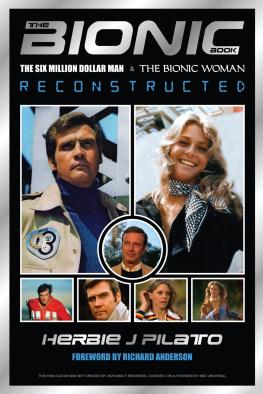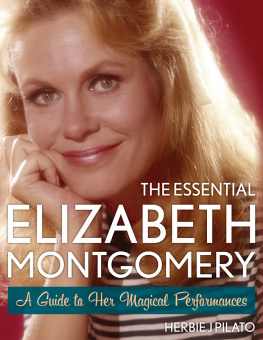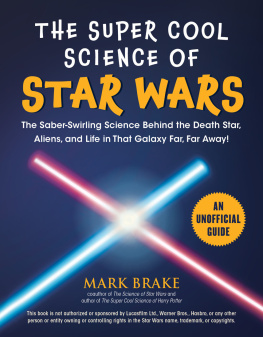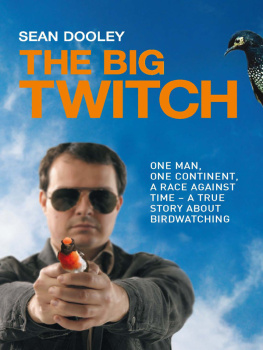TWITCH
UPON A
STAR
Published by Taylor Trade Publishing
An imprint of The Rowman & Littlefield Publishing Group, Inc.
4501 Forbes Boulevard, Suite 200, Lanham, Maryland 20706
www.rowman.com
16 Carlisle Street, London W1D 3BT, United Kingdom
Distributed by National Book Network
Copyright 2012 by Herbie J Pilato
First paperback edition 2014
All rights reserved. No part of this book may be reproduced in any form or by any electronic or mechanical means, including information storage and retrieval systems, without written permission from the publisher, except by a reviewer who may quote passages in a review.
British Library Cataloguing in Publication Information Available
The hardback edition of this book was previously cataloged by the Library of Congress as follows:
Pilato, Herbie J.
Twitch upon a star : the bewitched life and career of Elizabeth Montgomery / Herbie J Pilato.
p. cm.
Includes bibliographical references and index.
1. Montgomery, Elizabeth, 1933-1995. 2. ActressesUnited StatesBiography.
I. Title.
PN2287.M69335P55 2012
791.43028092dc23
[B]
2012017147
ISBN 978-1-58979-749-9 (hardback)
ISBN 978-1-63076-025-0 (pbk : alk. paper)
ISBN 978-1-58979-750-5 (electronic)
 The paper used in this publication meets the minimum requirements of American National Standard for Information SciencesPermanence of Paper for Printed Library Materials, ANSI/NISO Z39.48-1992.
The paper used in this publication meets the minimum requirements of American National Standard for Information SciencesPermanence of Paper for Printed Library Materials, ANSI/NISO Z39.48-1992.
Printed in the United States of America
For the highest good of all those concerned
Win, lose, or draw, Im going to keep on being Elizabeth Montgomery.
Elizabeth Montgomery, 1965
Lizzie didnt want to walk around for the rest of her life being Samantha.
Ronny Cox, friend and co-star of Elizabeth Montgomerys
I aint never met another woman I wanted to be like.
Belle Starr, as played by Elizabeth Montgomery in the 1980 TV-movie of the same name
PREFACE
In 1979, Elizabeth Montgomery appeared in the NBC TV-movie Jennifer: A Womans Story, in which she played Jennifer Prince, the widow of a wealthy shipbuilding executive. In this backdoor pilot for a new series (that Montgomery chose not to pursue), Jennifer battled the highbrow board members of her late husbands company that she struggled to control.
On Bewitched, which originally aired on ABC from 1964 to 1972, Elizabeth portrayed the beloved nose-wriggling house-witch Samantha Stephens. In an episode from 1969, The Battle of Burning Oak, Samantha and her feisty mother Endora (Agnes Moorehead) forged one of their rare but sturdy alliances, and set out to discredit the braggart members of a private mortal club. With this and every segment of Bewitched, Elizabeth played Samantha not so much as a witch-with-a-twitch, but as a woman who just so happens to be a witch who just so happens to twitch. How she machinated the magic was secondary to the sorcery itself; the supernatural acts were not nearly as pertinent as the distinguishing and ironic essence of Samantha: her humanity.
In like manner, Elizabeth eagerly utilized her benevolence with an extraordinary life and career, relinquishing an arrogance that could have easily evolved by way of her prestigious upbringing. As the liberal daughter of film and television legend Robert Montgomery, a staunch Republican, and Broadway actress Elizabeth Allen, an elegant Southern belle, she became disillusioned with the loftiness of Hollywood. She retained an unaffected demeanor on the set of any one of her nearly 500 individual television and film performances, or when approached on the street by some random fan. In either scenario, she relished the simple treasures of life, just as Samantha embraced the everyday, mortal way.
Elizabeth, however, was not immortal in real life. Her light was dimmed too soon. On May 18, 1995, she died a victim of colon canceronly two months after completing production of Deadline For Murder, her second CBS TV-movie as true-life Miami crime reporter Edna Buchanan (her first, The Corpse Had a Familiar Face, aired in 1994).
The shining star, the iconic actress, the outspoken political activist, the kind and loving mother to three children (with Bewitched producer/director William Asher: William, Jr., Robert, and Rebecca), and the very private and all-too-human woman was gone. It was devastating news for those within her intimate circle and to the millions of fans who continue to worship her from afar.
More than fifteen years after her painful demise, countless Facebook pages are adorned with her name; over 800,000 readers of TV Guide once voted her more popular than Barbara Eden, the star of classic TVs other supernatural blonde-led sitcom, I Dream of Jeannie (a blatant replica of Bewitched that infuriated Elizabeth); and her TV-movies remain classics.
In 1974, she received an Emmy nomination for A Case of Rape, which originally aired on NBC (a decade before the network aired the similarly themed film, The Burning Bed starring Farrah Fawcett). Case became the first issue-oriented TV-movie of its time, helped to change human rights and legislation for rape victims, and registered itself as one of the highest rated TV-movies in history.
In 1975, Elizabeth received another Emmy nomination for ABCs The Legend of Lizzie Borden (a namesake and alleged distant sixth cousin that she took a particular delight in portraying), which will soon be remade for the big screen.
Her feature films remain revered as well: 1955s The Court-Martial of Billy Mitchell; 1963s Whos Been Sleeping in My Bed? (in which she co-starred with Dean Martin and good friend Carol Burnett); and Johnny Cool, also released in 1963, directed by William Asher (who died in Palm Desert, California, on July 16, 2012, at age 90, due to complications from Alzheimers disease), whom she met and fell in love with on the set.
Approximately one year later, on September 17, 1964, Bewitched debuted and was party to the escapist entertainment that America sorely needed amidst the upheaval of the era. Elizabeth, like her contemporary, actress Jane Fonda (to whom she was frequently compared in appearance and talent), protested the countrys involvement with Vietnam. Her father was none-too-pleased with his daughters political views. Such opposition was an earmark for their entire relationship until the day he died, in 1981, succumbing to cancer, like Elizabeth.
A few years later, she delivered the chilling narration for two controversial feature film documentaries: Cover Up (1988), which detailed the murky circumstances surrounding the Iran-Contra affair, and The Panama Deception (1992), about the American invasion of Panama (which won the Oscar that year for Best Feature-Length Documentary). Into this mix she, along with Elizabeth Taylor, another legendary actress and good friend, became one of the first courageous few to lend support in the mid-1980s to those suffering from AIDS, then a widespread and misunderstood disease affecting mostly homosexual men.
Subsequently, among her multitude of enthusiasts are those within the gay community. Her appeal and notoriety with this portion of the population is unparalleled thanks in part to her humanitarian efforts for research into AIDS (no longer just a gay disease). In 1992, she sealed that acclaim when she served as Co-Grand Marshall for the Los Angeles Gay Pride Parade with former Bewitched star Dick Sargent (who had recently exited the closet).
Through it all, the central message of Bewitched, as she suggested, believed, and trumpeted, was prejudice.
Next page







 The paper used in this publication meets the minimum requirements of American National Standard for Information SciencesPermanence of Paper for Printed Library Materials, ANSI/NISO Z39.48-1992.
The paper used in this publication meets the minimum requirements of American National Standard for Information SciencesPermanence of Paper for Printed Library Materials, ANSI/NISO Z39.48-1992.